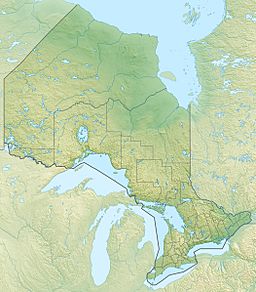Link Lake (Temagami) facts for kids
Quick facts for kids Link Lake |
|
|---|---|
| Location | Temagami, Nipissing, Ontario |
| Coordinates | 47°04′18″N 79°49′04″W / 47.07167°N 79.81778°W |
| Type | Lake |
| Max. length | 3.1 km (1.9 mi) |
| Max. width | 0.3 km (0.19 mi) |
| Surface elevation | 300 m (980 ft) |
Link Lake is a long, thin lake located in a beautiful part of Northeastern Ontario, Canada. It's found in an area called Temagami, within the Nipissing District. This lake is part of a much larger water system that eventually flows into the Ottawa River.
On the northern side of Link Lake, you can find the remains of an old, abandoned town called Milne Townsite. It's a glimpse into history!
Discovering Link Lake
Link Lake is known for being quite narrow, stretching out for about 3.1 kilometers (almost 2 miles). Even though it's long, it's only about 0.3 kilometers (less than a quarter-mile) wide. This makes it feel more like a river in some places!
Where is Link Lake?
This interesting lake is located in Strathy Township, which is part of the larger Temagami region in Ontario. Temagami is famous for its vast forests, many lakes, and rich mining history. Link Lake sits about 300 meters (984 feet) above sea level.
The Water's Journey
The water from Link Lake doesn't just stay put; it's always on a journey! The main way water leaves Link Lake is through a stream called Johnny Creek. This creek flows into another lake called Net Lake.
From Net Lake, the water continues its path through several other lakes, including Cassels Lake and Rabbit Lake. Eventually, it reaches the Matabitchuan River. This river then carries the water into Lake Timiskaming, which is a large lake on the border between Ontario and Quebec. Finally, all this water joins the mighty Ottawa River. So, Link Lake is a small but important part of a very big river system!
A Special Rock Zone
Link Lake is also important to geologists, who study rocks and the Earth. That's because the lake sits right on top of something called the Link Lake Shear Zone. A shear zone is like a giant crack or fault in the Earth's crust where rocks have moved and slid past each other over millions of years. Imagine two huge blocks of rock grinding together – that's what happens in a shear zone! This zone runs right along the length of the lake.
 | Audre Lorde |
 | John Berry Meachum |
 | Ferdinand Lee Barnett |


